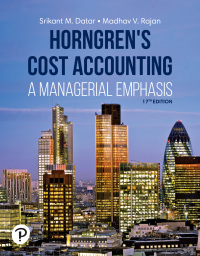Question
BEL produced and sold 167,000 watches in 2020. The standard costs on a per-unit basis for 2020 are as follows: direct material: 50 grams per
BEL produced and sold 167,000 watches in 2020. The standard costs on a per-unit basis for 2020 are as follows: direct material: 50 grams per watch $0.08/gram direct labour: 3 minutes per watch $15 per hour You are also given the actual 2020 cost breakdown as follows: direct materials: $623,000 (8,900,000 grams) direct labour: $172,500 (11,500 hours)
BEL has been considering purchasing a new piece of equipment to manufacture Kore 2.0 that may be the answer to its declining margins. The Fitness tracker Machine 3000 (FTM 3000) is new on the market, and it uses the latest technology in fitness tracker manufacturing. The FTM 3000's producer, which is based in China, has an excellent reputation, and the equipment is said to reduce the production time by 20%; therefore, BEL would expect a decrease in direct labour and variable overhead of 20%. William feels that the actual 2020 labour costs were an anomaly and expects these savings to be based on the 2020 standard costs of labour. Variable overhead is currently added at a rate of $0.93 per unit. The FTM 3000 can be accommodated in the space that BEL already has, and includes a five-year warranty. The equipment costs are as follows: purchase cost: $100,000 present value of tax shield: $10,600 maintenance: $2,000 per year
The equipment comes with free online training and support for the warranty period. However, the training and support are provided in Mandarin, so BEL will rely on one of its employees to translate. The equipment requires BEL to use a different glue than it currently uses, which will increase the direct material cost by $0.11 per watch. The selling price of Kore 2.0 will also remain unchanged at $15 per watch. William thinks the sales of Kore 2.0 peaked in 2020, and he expects sales for this fitness tracker to be constant for the next five years. However, with changing trends, the company is not sure what will happen after that. The equipment can be resold for $40,000 at the end of year 5, and would result in a lost tax shield amount of $1,080. The tax rate is 25%, and BEL uses an 8% weighted average cost of capital when evaluating this type of investment. Analyze whether or not BEL should purchase the equipment.
Step by Step Solution
There are 3 Steps involved in it
Step: 1

Get Instant Access to Expert-Tailored Solutions
See step-by-step solutions with expert insights and AI powered tools for academic success
Step: 2

Step: 3

Ace Your Homework with AI
Get the answers you need in no time with our AI-driven, step-by-step assistance
Get Started


